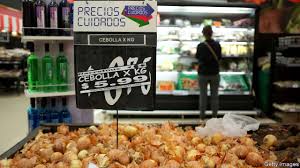Prices, according to economists, are determined by supply and demand, acting like the twin blades of a pair of scissors.
經濟學家認為,價格是由供需決定的,就像剪刀的雙刃一樣。
But that is not the whole story. In many times and places, prices have instead been set by the blunter blades of political pressure and government response.
但這還不是全部。在很多時期和地方,經濟反而是由政治壓力和政府回應的鈍刀所決定的。
One of the oldest surviving texts, the Hammurabi code, includes elaborate price and wage controls:
現存最古老的文獻之一《漢謨拉比法典》中包括了詳盡的價格和工資控制:
2.5 grains of silver per day for a rowing boat, six for a labourer.
劃艇每天2.5粒銀,體力勞動者每天6粒。
At the other end of history, on January 7th Argentina's government updated its list of precios cuidados (managed prices),
在歷史的另一端,1月7日,阿根廷政府更新了其物價監管措施名單,
setting guidelines for over 300 supermarket products, including lettuce, ultra-thin condoms and mate, a traditional tea-like drink.
為超過300種超市產品制定了參考價格,包括生菜、超薄避孕套以及一種傳統茶類飲料。
Via a mobile-phone app, consumers can report any products
通過手機應用,消費者可以報告任何
that are missing from the shelves or any prices that are managed less tightly than the government would like.
缺貨商品或任何超過政府參考價格的商品。

According to new data collected by the World Bank, 89% of developing economies meddle with the price of energy,
根據世界銀行收集的新數據,89%的發展中國家都會干預能源價格,
76% with the price of foodstuffs (bread in Benin, sugar in Congo, rice in Haiti) and 13% with the price of construction materials.
76%會干預食品價格(貝寧的面包、剛果的糖、海地的大米),13%會干預建筑材料價格。
Burkina Faso, for example, controls the prices of cement, sheet metal and reinforcing bars.
例如,布基納法索會管制水泥、薄板和鋼筋的價格。
Governments generally impose price controls for one of three reasons: to redistribute, stabilise or deflate.
政府通常會以這三個理由之一作為實施價格管制的原因:為了再分配、穩定或或緊縮。
Price caps help the poor afford necessities of life; price floors prop up the livelihoods of farmers.
價格上限幫助窮人購買生活必需品;最低價格支撐著農民的生計。
Buffer stocks try to stabilise volatile commodity prices,
緩沖庫存想要穩定波動的大宗商品價格,
especially if it is costly for farmers to switch back and forth between crops that fall in and out of market favour.
尤其是當農民在市場青睞的作物和不受市場青睞的作物之間來回轉換的成本很高時。
Controls have also been deployed to fight inflation. Argentina's previous president, Mauricio Macri,
控制也被用于對抗通貨膨脹。阿根廷上一任總統毛里西奧·馬克里
had hoped to downplay the precios cuidados introduced by his predecessor, Cristina Fernandez de Kirchner,
曾希望可以淡化他的前任克里斯蒂娜·費爾南德斯·德基什內爾推出的物價監管措施,
but unstoppable inflation prompted him instead to go further, freezing prices in 2019 for over 60 essential goods.
但不可遏制的通貨膨脹反而促使他更進一步,在2019年凍結了60多種必需品的價格。
The ubiquity of price controls shows that economists have less influence than many people think.
無處不在的價格管制表明經濟學家的影響力不如眾人所認為那么大。
譯文由可可原創,僅供學習交流使用,未經許可請勿轉載。












